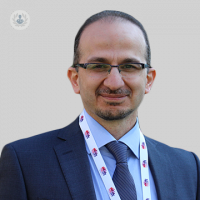Why should someone with diabetes consider weight-loss surgery?
Written in association with:Mr Ali Alhamdani, a leading bariatric surgeon, discusses the use of weight-loss surgery in treating both morbid obesity and type II diabetes. Mr Alhamdani is an expert in this revolutionary use of bariatric surgery, and he has presented about this at the first ever International Bariatric Club World Congress in 2018.
Are there risks involved with bariatric surgery?
There are risks associated with any general surgical operation, weight loss surgery is not excluded. However, significant technical advances in weight loss surgery techniques and equipment have taken place making the chance of having any complication significantly lower than any other operation. For example, the theoretical chance of dying from some operations, like removing the oesophagus for cancer or colon cancer, is 5 and 3% respectively. The chance of dying from gastric bypass is 0.3% or 3 in a thousand. It is worth mentioning that so far I have performed 2500 weight-loss procedures with no mortality.

What are the chances of curing diabetes?
The problem with diabetes is not the sugar control but its devastating long-term consequences, like heart attacks, stroke, kidney damage, eye damage and high blood pressure. It is just like a cancer that gradually spreads through all of the body until it destroys it all. Diabetes is not only limited to a category or ethnic population, it is a life-threatening epidemic that could affect anyone in the world.
Weight loss surgery is the only recognised treatment that can offer a cure for type II diabetes, in comparison to the different modalities of medical armamentarium to treat this disease. Worldwide data has shown that the chance of inducing remission of this disease is around 75-80 %. Worldwide research also informs us that the chance of cure is less with people who have had diabetes for more than 10 years. Hence, early treatment of morbid obesity is highly recommended to prevent the development of this disease.
Will I still need some form of diabetes treatment in the future?
If we manage to catch diabetes at early onset, then the chance of cure is very high. The longer diabetes is with the patient, the more chance the patient will not be fully cured from it. However, with weight loss surgery, it will be much easier to control and much easier to prevent the life-threatening consequences of diabetes.
It is worth mentioning that the possibility of a person contracting type II diabetes with a body mass index (BMI) above 40kg/M2 is 90%. Therefore, prevention is always better than treatment. Therefore, I advise any patient with morbid obesity with a BMI of 40kg/M2 to take urgent action to treat their morbid obesity before it is too late.
I do feel strongly for a patient who visited me a few months ago with the following history: a 48-year-old gentleman with a history of uncontrolled type II diabetes, with kidney failure and severe uncontrolled ischaemic heart disease. He was on home oxygen due to severe COPD due to his history of smoking. I, unfortunately, denied him the surgical option and referred him to my dietician to try conservative options. The reason he was denied surgery was that he is a very high-risk patient and he would not be able to survive the surgical option, not because of the surgery itself, but because of the general anaesthetic. He would not wake up if he went under general anaesthetic.
What are the other health benefits of bariatric surgery?
I always say to my patients that we do bariatric surgery, not to be prettier or only to lose weight, but actually, we perform bariatric surgery to be healthier. We do bariatric surgery to avoid:
- Heart attacks
- Stroke
- Obstructive sleep apnoea
- Hypertension
- To prevent and treat type II diabetes
- To treat infertility in men and women (especially with polycystic ovaries)
- To prevent and treat benign intracranial hypertension
- To prevent and treat arthritis
- To improve our kidney function
These are the reasons that we need weight loss surgery. Make an appointment with an expert to discuss treatment options for morbid obesity and type II diabetes.


